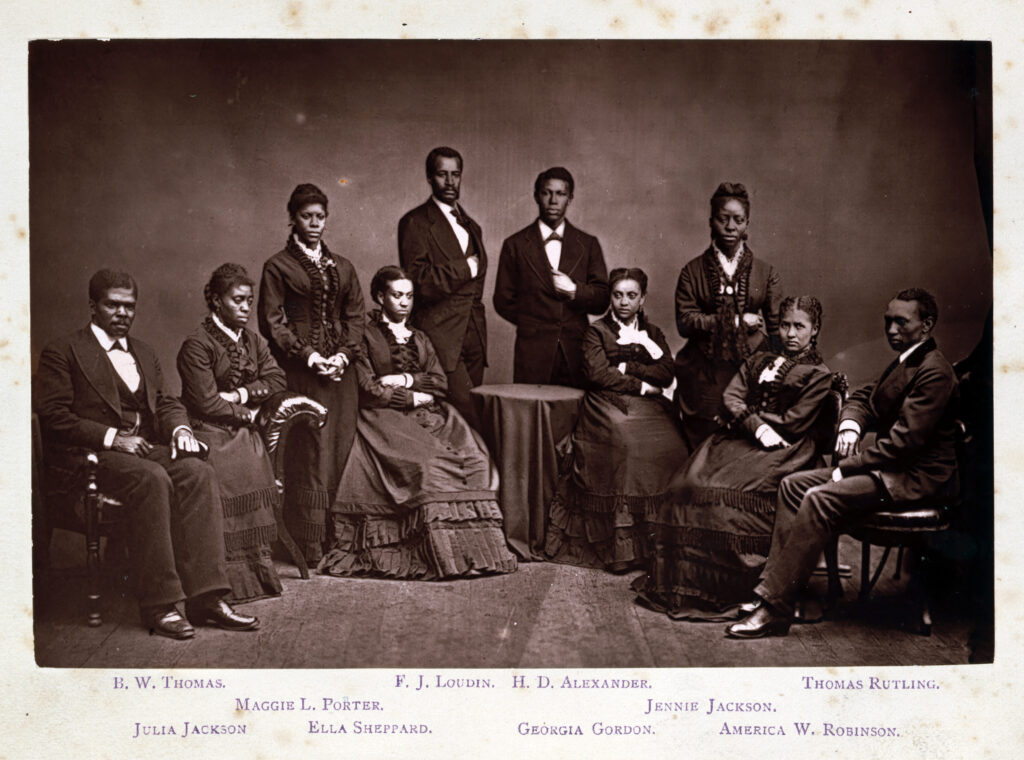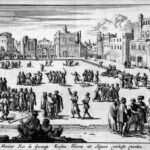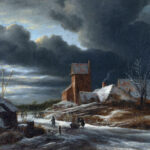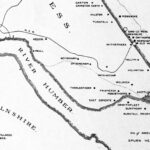3 August 1873: Eight years after the end of slavery in the United States, the Fisk Jubilee Singers sing spirituals in a crowded Hull street

The Fisk Jubilee Singers (Anon 1875).
J.B.T. Marsh. 1875. The Story of the Jubilee Singers, 2nd Ed. London: Hodder and Stoughton. Get it:
.Excerpt
The singers had spent over three months in London, and arrangements were now made for a tour in Scotland, with a visit to a few of the larger cities on a the way. Hull, the birthplace of Wilberforce, was reached, by a pleasant coincidence, on the first of August, the anniversary of emancipation in the British colonies. Here it was decided to try the plan adopted at Dr Allon’s chapel in Islington, and find how it would work in the provinces. 1,500 invitations to a concert in the Hope Street Chapel were sent out to those most likely to be interested. The collection, which seemed a very large one to the friends who had charge of the arrangements, amounted to about £52. When it was explained that not less than £100 ought to be realised from each evening’s work, if the mission to Great Britain was to be a success, some of the good friends insisted on another trial, with an admission fee. Sitting by his window at the hotel in Hull on Sunday evening, and noting the tide of people flowing idly by, Mr White proposed an extempore religious service for their benefit. Taking the base of the King William monument as a platform, Mr Pike preached and the singers sang of the love of Christ, to a crowd that filled the street farther than the voice of either speaker or singer could be heard. Tears trickled down the cheeks of many to whom the sound of prayer or religious song was apparently almost unknown. When the time came, Hengler’s Cirque, in spite of a rainy evening, and to the delight of all, was crowded, and the receipts were £140.
Comment
Comment
Sunday and Monday have been swapped in order to reflect the order of events reported by the local newspaper (which however missed the unofficial programme):
These singers, who are slave students of Fisk University, Nashville, Tennessee, gave one of their services of song on Friday evening in the Hope Street Congregational Church. They have come to England for the purpose of obtaining funds for the establishment of a college in America for the education of their race. The chapel was completely crowded. The party sang with a great amount of wild pathetic beauty, and into some of their songs threw much feeling. At the conclusion of the service it was announced that the collection which had been made had realised £52 10s. towards the object in view. The accompanist of the singers stated that this amount was one of the largest collections they had ever received. They had tried the experiment of appealing to congregations in the same manner as on this occasion, but it had been a failure, and they had been compelled to make a charge of admission of 2s. The Revs. W.M. Statham and W.C. Preston stated that they had prevailed upon the singers to give a second performance. On Sunday afternoon the singers appeared again at the Hope Street chapel, before a densely packed audience. On Monday this troupe of singers visited the Southampton training ship, and inspected the vessel, also seeing the boys drill. The visitors then sang some of their pieces in the schoolroom, greatly to the enjoyment of the boys. Mr. Alderman Fountain and Mr. T. Haller, two members of the committee, were present on board at the time. On Monday evening they gave a concert at Hengler’s Cirque, the entertainment being well attended (Hull Packet 1873/08/08).
The Times (my bold):
THE JUBILEE SINGERS.-Yesterday afternoon, at the invitation of Lord Shaftesbury and the Council and committee of the Freedman’s Aid Society, a large company, including the Duke and Duchess of Argyll, assembled at Willis’s Rooms to hear a little band of black vocalists, known as Jubilee Singers. Before the concert commenced Lord Shaftesbury described the object with which it was given. The band consisted of seven young women and four young men, nearly all of them emancipated slaves. They were students connected with the Fisk University, one of seven chartered institutions established in the States by the American Missionary Association, to give the freedmen a high and Christian education, and qualify them to become the teachers and leaders of their race in America, the West India Islands, and Africa. The young persons on the platform would sing the old slave songs, composed by their fathers in the darkest hours of their bondage. For the last year and a half they had been singing before audiences in the Northern States, receiving great favour. Now, anxious to raise money to build a Jubilee-hall – the first permanent building of Fisk University – they came to England under the auspices of the American Missionary Association. Eight thousand of the fourteeen thousand pounds required had already been secured by their efforts. “You will hear from them,” writes Mr. Henry Ward Beecher to a friend in London, “the wild slave songs, some of which seem like the inarticulate wails of breaking hearts made dumb by slavery. You will hear the plantation songs, in short, the inner life of slave hearts expressed in music. We are not ashamed to send this band to our British brethren, and we sure that their music will strike a chord which will vibrate long after their songs shall cease.” Mr. George Macdonald had written to the same effect:-“There is something inexplicably touching in their wonderfully sweet, round, bell voices; in the way in which they sing, so artless in its art, yet so consummate in expression; and in the mingling of the pathetic with the unconscious comic in the rude hymns shot here and there with a genuine golden thread of poetry.” We cannot say that the expectations raised by these praises have been disappointed. Though the music is the offspring of wholly untutored minds, and, therefore, may grate upon the disciplined ear, it possesses a peculiar charm. Like the music of the ancient Greeks, it dispenses with the fourth and seventh tones – a curious and suggestive circumstance. The fourth piece in the programme, entitled “Turn back Pharaoh’s army,” was given with particular effect. At the conclusion of the concert Lord Shaftesbury tendered the thanks of the audience to the singers, who, it was announced, would appear on Monday evening next at the Hanover-square-rooms (Times 1873/05/07).
Some London audiences would already have had experience of non-native pentatonism, albeit mild, in chinoiserie like the 1850s Aladdin Quickstep.
Something to say? Get in touch
Original
The Singers had spent over three months in London, and arrangements were now made for a tour in Scotland, with a visit to a few of the larger cities on a the way. Hull, the birthplace of Wilberforce, was reached, by a pleasant coincidence, on the first of August, the anniversary of emancipation in the British colonies. Here it was decided to try the plan adopted at Dr. Allon’s chapel in Islington, and find how it would work in the provinces. Fifteen hundred invitations to a concert in the Hope Street Chapel were sent out to those most likely to be interested. The collection, which seemed a very large one to the friends who had charge of the arrangements, amounted to about £52. When it was explained that not less than £100 ought to be realised from each evening’s work, if the mission to Great Britain was to be a success, some of the good friends insisted on another trial, with an admission-fee. Sitting by his window at the hotel in Hull on Sunday evening, and noting the tide of people flowing idly by, Mr. White proposed an extempore religious service for their benefit. Taking the base of the King William monument as a platform, Mr. Pike preached and the Singers sang of the love of Christ, to a crowd that filled the street farther than the voice of either speaker or singer could be heard. Tears trickled down the cheeks of many to whom the sound of prayer or religious song was apparently almost unknown. When the time came, Hengler’s Cirque, in spite of a rainy evening, and to the delight of all, was crowded, and the receipts were £140.
283 words.
Similar
 27 July 1822: An inquest at York finds that John Furnel of the Queen’s Regiment of Foot died of flogging and resulting illness
27 July 1822: An inquest at York finds that John Furnel of the Queen’s Regiment of Foot died of flogging and resulting illness 20 June 1681: A Leeds court hears of the enslavement by North African pirates of the son of Alderman Foxcroft
20 June 1681: A Leeds court hears of the enslavement by North African pirates of the son of Alderman Foxcroft 10 March 1665: Blizzards and Dutch attacks prolong Restoration-induced shortages of fodder and coal at Northowram (Halifax)
10 March 1665: Blizzards and Dutch attacks prolong Restoration-induced shortages of fodder and coal at Northowram (Halifax)Search
Donate
Music & books
Place-People-Play: Childcare (and the Kazookestra) on the Headingley/Weetwood borders next to Meanwood Park.
Music from and about Yorkshire by Leeds's Singing Organ-Grinder.



 Bluesky
Bluesky Extwitter
Extwitter